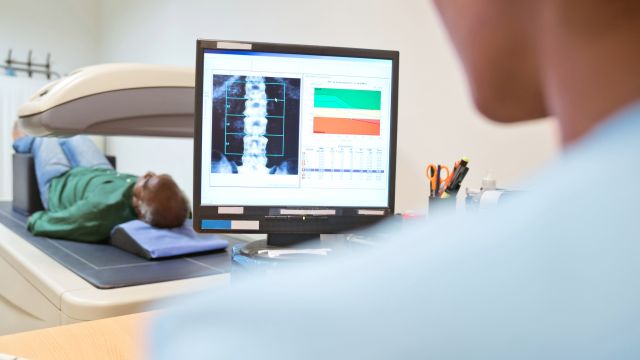Updated on May 27, 2024
Systemic mastocytosis is a group of disorders characterized by an overgrowth of mast cells. Mast cells are a type of white blood cell that—under normal circumstances—help the body fight infections and repair injuries. With systemic mastocytosis, the body produces abnormal mast cells. These abnormal mast cells replicate at an increased rate and are also more active than normal mast cells.
In mild forms of systemic mastocytosis, this mast cell buildup can cause skin lesions, skin flushing, fainting, fatigue, headaches, gastrointestinal problems, and other symptoms. In more severe forms of the disease, mast cell buildup can cause life-threatening damage to multiple organs and tissues, including the bones, bone marrow, liver, lymph nodes, and small intestine.
Indolent systemic mastocytosis (ISM) is the mildest form of the disorder and also the most common. Though people with ISM typically have a normal life expectancy, the condition does come with several serious health risks—it can progress into more advanced forms, and it also puts a person at risk for anaphylaxis, a life-threatening allergic reaction.
Treatment for indolent systemic mastocytosis
There is no known cure for ISM, and treatment focuses on controlling symptoms and preventing complications. Treatment for ISM can be a bit different for everyone, and a healthcare provider will be your best source of information.
Discuss identifying and avoiding triggers
When mast cells become active, they release chemicals called mediators. Mediators are what drive the inflammation that occurs when the body encounters an infection or sustains and injury. Mediators are also what drive the symptoms that occur with systemic mastocytosis.
Since mast cells only release pro-inflammatory chemicals when activated, it helps to avoid any triggers that cause mast cells to become active. Everyone with ISM should discuss triggers with a healthcare provider, including how to identify and track triggers.
While triggers can vary from person to person, some potential triggers include:
- Alcohol
- Stress
- Spicy foods
- Physical pain
- Infections
- Medications such as non-steroidal anti-inflammatory drugs (NSAIDs), opioids, local anesthetics, antibiotics, and contrast dyes
- Allergens, such as pollen, pet dander, or dust mites
- Fumes, smoke, or other types of pollution
- Heat, cold, or sudden temperature changes
- Bites and stings from insects, spiders, jellyfish, and snakes
- Skin irritation, such as friction or vibration
- Certain vaccines
Discuss medications for ISM
People with ISM may be prescribed a number of different medications to help control symptoms.
The medications your healthcare provider recommends will depend on your symptoms and other factors, including medications you have tried in the past. Medications that you discuss may include:
- Antihistamines. Antihistamines are medications that block histamine, a type of mediator released by mast cells. The type of antihistamine prescribed will depend on the symptoms a person experiences. H1 antihistamines are used to treat flushing and skin itching, while H2 antihistamines are used to treat gastrointestinal symptoms.
- Mast cell stabilizers. These are drugs that prevent mast cells from releasing mediators.
- Leukotriene modifiers. Leukotriene is a type mediator released by mast cells. Leukotriene modifiers block this mediator, and may be used to treat itching, flushing, and gastrointestinal symptoms.
- Proton pump inhibitors. These medications are used to treat gastroesophageal reflux, where stomach acid backflows from the stomach to the esophagus, another potential symptom of ISM. Proton pump inhibitors help treat this by reducing the amount of acid made by glands in the stomach.
- Tyrosine kinase inhibitors (TKIs). TKIs are a type of targeted therapy, a drug that targets cells with specific abnormalities. TKIs block substances that abnormal mast cells need to grow and divide. Certain TKIs are used in the treatment of ISM.
Discuss the health of your bones
Systemic mastocytosis can cause damage to the bones, and people with ISM may be at risk for osteoporosis (bone loss) and fractures. There are tests that can measure bone density and check for these problems.
Discuss any history of allergies
A discussion of known allergies and any history of allergic reactions should be a part of an initial diagnosis of ISM. For anyone with an allergy to bee or wasp venom, discuss therapies to prevent allergic reactions.
Discuss your emergency plan
It is recommended that people with systemic mastocytosis carry epinephrine autoinjectors (usually two). These are used as emergency treatment in the case of anaphylaxis or life-threatening episodes of severe low blood pressure. It is also recommended that a person wear a medical alert ID (usually a bracelet or necklace) and have a written plan to follow in case of an emergency.





